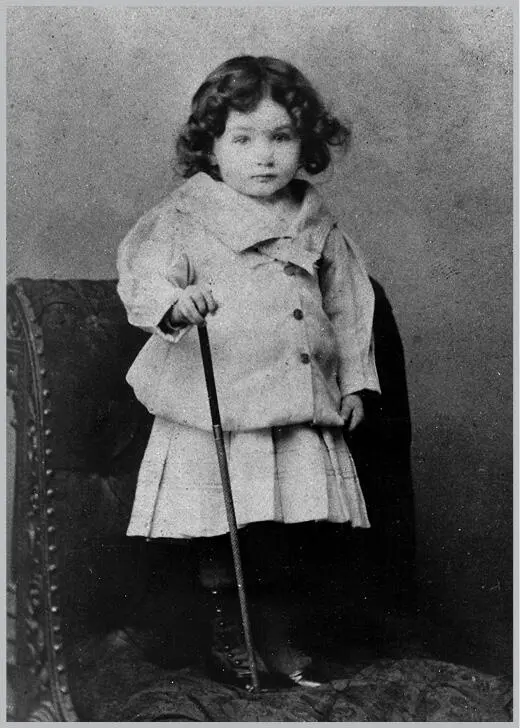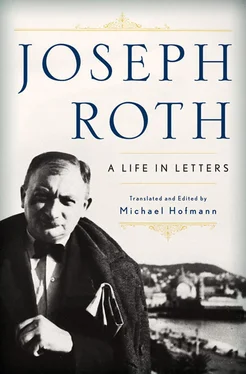As I read and translated, and reread and retranslated, I was repeatedly reminded of a couple of lines of Goethe’s Faust —Malcolm Lowry used them as one of the epigraphs for Under the Volcano —“wer immer strebend sich bemüht, den können wir erlösen,” roughly, whoever strenuously endeavors, him can we rescue. No more strenuous trier before the Lord than Joseph Roth.
Michael Hofmann
Gainesville, Florida
January 2011
PART I. 1894–1920: Youth, War, Brody, and Vienna

JOSEPH ROTH, AGE THREE
[Moses] Joseph Roth was born in Brody in Galicia, then part of the Austro-Hungarian Empire, on 2 September 1894, “under the sign of the Virgin,” as he writes drily in no. 98, “to whom my given name of Joseph stands in some vague relation.” He was Joseph, Mary in this instance was his mother, but there was no immaculate conception, no baby Jesus, and no man in the house. While “Mu” remained an only child, his mother was one of seven, and he had many Grübel or Grubel uncles and aunts and cousins, with some of whom he remained in touch all his life. (After his death, his favorite cousin, Paula Grübel, traveled to Paris, to give her stock of his early manuscripts and offprints to Blanche Gidon, his translator into French, who kept them safe during the occupation and the war.) They were not exactly poor (there were visits to the photographer, smart clothes, violin lessons, even a maid, at least some of the time), but Roth’s lifelong aversion to the idea of home will have dated from then (a lodger, his mother’s brave face and forbidding bosom, and pride and shame and continual anxiety); the town — whose very name he was often careful to suppress later, in favor of the more German-sounding “Schwaby,” or even “Schwabendorf,” so redolent was Brody (anti-Semitically evoked in a 1900 English Baedeker : “They differ in their dress and the mode of wearing their hair from the other inhabitants, who despise them”)1 of Galicia and the poor, dirty, and, above all, Jewish east; while dealings with his uncles will have left him neuralgically sensitive to any subsequent combination of money and advice (when forthcoming from Stefan Zweig, say).
The young Moses went to gymnasium in Brody. He was gifted, precocious, and studious, took his exams with distinction, enrolled at the University of Lemberg in 1913, and went on to complete six semesters of German at the University of Vienna. As his first poems and articles started to appear, he took the “Moses” off his name (it’s there for his Viennese Jewish in-laws, though, and during one crisis in 1926, in letters to Reifenberg, it makes a short and moody reappearance). It’s curious that he started to publish and learned to dissemble at the same time. In 1917 in a typical volte-face — he was a pacifist just three years before — he volunteered for the army; saw his native Galicia, only now under Mars; made his way back to Vienna; found himself (as the British say) cushy billets as a censor and on an army newspaper. It is good to read those sensibly less than valiant lines to his cousin Paula on the advantages of being out of range of the Russians; before Roth launched the myth of his officer’s career — a corrective myth his life seemed to require, something like a pair of spectacles, as David Bronsen sweetly puts it. Similarly, those epically haphazard and chaotically adventurous returns from the front described in Flight Without End or The Emperor’s Tomb or Hotel Savoy were not his lot. He was back in Vienna pretty promptly in December 1918, in the same awkwardly dyed ex-army gear as everyone else, got his start on a new progressive newspaper, Der Neue Tag , in April 1919, published a hundred pieces in the year before it folded, and in June 1920, a refugee from unemployment and inflation in Austria, he moved to Berlin.
The early letters are all personal and familial, to his Grübel cousins in Lemberg. They are joshing and showing off, affectionate and condescending. One can see in Roth a desire for independence (he needs license not to write to his uncle), and, at the same time, rather movingly, a wish to support, educate, encourage, cultivate these younger or female cousins. (One might think of the regular pattern, later in his life, where, hard up and managing to obtain a little money for himself, he straightaway transfers half of it to others; their need seems as great, or greater.) Unfledged himself, he shelters others under his wings. One might note, finally, that these are the only letters in which Roth sounds young , in fact like a young shuttlecock: frisky and agile, youthfully pompous or lightheartedly pugnacious, boasting of his publications, his undergraduate “red sofa with yellow trim,” amusing himself with Venice and Vienna, observing his Flemish neighbors and their Christian dogs, and entertaining the prospect of Albania. It is a tone worth cherishing, because once he’s twenty-five and in Germany, you won’t hear it again.
1. To Resia Grübel1
[Schwabendorf, holidays 1911]
Dear Resia,
I want to answer your letter as promptly as you wrote it — if not more so, seeing as it’s Sunday, and there’s little to do. When I wrote in my last letter to ask if I might come, that wasn’t a serious inquiry: you shouldn’t take everything seriously. I am a sworn enemy to etiquette.2 Now I’m not sure if I will be able to come, because I’ve been set some reading to do. It’s all because I’m an “A” student, and more is required of us. Anyway, I know I won’t be able to talk Mama into going, she never wants to leave the house. She seeks various pretexts for this, and since the help was discreetly “let go” yesterday, and there’s little chance of finding a suitable replacement, the prospect of my visit has rather receded. Well, the sky won’t fall down on top of us. And if we should be able to come after all, then we can do all the nice things you suggest.
I gave Christiampoller3 your best; he would have leapt straight into an eighth heaven, had it existed. But as there are only seven, he contented himself with the seventh of them, and thousands of little lights sparkled before his eyes, and he heard choirs of seraphim and cherubim, just like in Goethe’s Faust , which, alas and alack, you haven’t read. He — i.e., Christiampoller, not Faust — will probably come to Lemberg. It’ll be good. He’s been brushing his hair and pressing his pants for three weeks now. All for Lemberg. Of course, he’s not as industrious as he used to be, and his studies suffer as a consequence.
I don’t understand why you’re so worried about the war. It seems to preoccupy you all day.
Why do I not hear from Paula?4 Perhaps she’s waiting for me to turn up on the doorstep? If we do come, I’ll give you notice. For the moment, be well, and write back! Pronto!
Kisses
Your cousin M.5
With much love to everyone.
1. Resia Grübel was Roth’s cousin, daughter of his mother’s brother Siegmund Grübel. The family lived in Lemberg/Lvov/Lviv, not far from Brody.
2. sworn enemy to etiquette: either never true or subsequently abandoned. JR was Old World in his courtliness. The phrase itself has, one might note, an element of etiquette within it.
3. Christiampoller: a local character, in Brody (two names presumably run together as one, for comic effect).
4. Paula: Resia’s younger sister. See note in following letter.
5. M. short for Muniu, Roth’s nickname as a child, the Polish diminutive form of Moses, his given name.
Читать дальше













